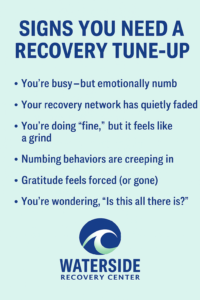You’ve stayed sober. You’ve kept the promises you made to yourself. And yet, lately… something feels off.
You’re not in crisis. You’re not white-knuckling. But life feels muted, uninspired. Maybe even lonely. You’ve done the work, so why does it feel like you’re just coasting?
If this resonates, you’re not broken—and you’re not alone. At Waterside Recovery, we support alumni across Plymouth and Bristol Counties, MA, who find themselves here: long-term sober, but quietly stuck.
Here’s the truth: recovery doesn’t stop evolving. What worked for you a year ago may not serve who you are today. These 6 signs can help you recognize if it’s time to reconnect, recalibrate, or refresh your recovery.
1. You’re Busy—But Emotionally Numb
Your schedule is full, but your spirit feels empty. You’re functioning—meeting deadlines, caring for others—but inside, there’s a quiet disconnect.
This emotional flatness is common in long-term sobriety. It can creep in slowly, and it often isn’t dramatic. That’s what makes it easy to miss.
Sobriety gave you a second chance. But emotional numbness can signal it’s time to deepen—not abandon—your recovery work.
Tuning back in doesn’t mean starting over. It means expanding your recovery to support the version of you that’s showing up now.
2. Your Recovery Network Has Quietly Faded
Maybe you used to check in with a sponsor weekly. Maybe you attended meetings, or had a sober friend group that “got it.” Over time, life gets busy—and without realizing it, those connections thin out.
Suddenly, you’re navigating life solo again. And while independence can be a strength, isolation rarely serves recovery.
If you find yourself missing that sense of being understood without explanation, that’s a gentle nudge toward reconnection. Whether it’s rejoining a group, finding an alumni event, or just texting someone who’s been there—it matters more than you think.
3. You’re Doing “Fine,” But It Feels Like a Grind
Long-term sobriety isn’t all gratitude lists and clarity. Sometimes, it’s just tired. And when tired turns into “numb,” it’s time to pay attention.
You’re using your tools. You’re avoiding old patterns. But lately, even that feels like a chore.
This doesn’t mean your recovery is broken. It means your life has grown—and your support system might need to grow with it.
Consider a refresher program, a workshop, or just a new rhythm. You’re not going backward. You’re building forward with intention.
4. Numbing Behaviors Are Creeping In (Even Without Alcohol)
You haven’t picked up a drink. But maybe you’re zoning out with screens every night. Or working constantly. Or emotionally shutting down in relationships.
These are common in long-term recovery—not as failures, but as signals.
Your brain learned to soothe pain through escape. And while you’ve removed alcohol, the impulse to numb doesn’t always disappear. It morphs.
When new patterns start to echo old ones, it’s time to ask: what am I avoiding—and what do I need instead?
Recovery isn’t about perfection. It’s about staying honest—and responsive—to your emotional needs.

5. Gratitude Feels Forced (Or Gone)
There was a time when waking up sober felt like a miracle. Now, it feels… expected. Maybe even burdensome.
When that quiet sense of gratitude goes missing, it doesn’t mean you’re ungrateful. It often means you’re out of alignment. Maybe life got crowded with responsibilities. Maybe you haven’t had space to reflect. Maybe you’ve outgrown old structures and need something new.
A recovery refresh—like sober coaching, new therapy, or a spiritual check-in—can help bring you back into alignment with the reasons you chose this path in the first place.
6. You’re Wondering, “Is This All There Is?”
This is the most subtle—and most powerful—sign. A question whispered inside: I did everything I was supposed to do. So why do I feel stuck?
That voice isn’t your enemy. It’s your inner self, calling you forward.
At Waterside Recovery, we don’t believe recovery has a finish line. We believe it has chapters. And when you hit a plateau, it often means a new one is waiting to begin.
A refresher in alcohol addiction treatment doesn’t mean you’re failing. It means you’re ready to grow, again.
How a Recovery Tune-Up Can Help
A tune-up isn’t a redo—it’s an upgrade. It might look like:
- A short-term alumni check-in program
- Joining or starting a peer-led group
- Re-engaging with therapy
- Exploring new coping skills for current challenges
- Finding new meaning or direction in sober life
Whether you’ve been sober for 1 year or 10, your needs deserve attention.
FAQ: Refreshing Your Recovery
Do I need to “go back to treatment” if I’m still sober?
Not necessarily. Many alumni benefit from short-term, outpatient refreshers or individual therapy sessions rather than full programs. The goal is to support, not reset.
What if I’m not in a crisis—just feeling stuck?
That’s actually the best time to reach out. You don’t need to wait for a breakdown to tune back in. Feeling stuck is a valid reason to seek more support.
How does Waterside Recovery support alumni?
We offer alumni groups, community events, refreshers, and access to outpatient services tailored for long-term sobriety. You’re always welcome to reconnect—on your terms.
Is it normal to feel this way after years of sobriety?
Completely. Emotional plateaus, disconnection, and questioning are common. Recovery evolves. And you’re allowed to grow with it.
Ready for Something More?
If you’re in Plymouth or Bristol County and this blog hit home, it might be time to take that next step. Not because you’ve failed—but because you’re ready for more.
Let’s talk about what that could look like. Call (866) 671-8620 or visit our alcohol addiction treatment page to explore your options. Your sobriety matters. So does how you feel living it.


